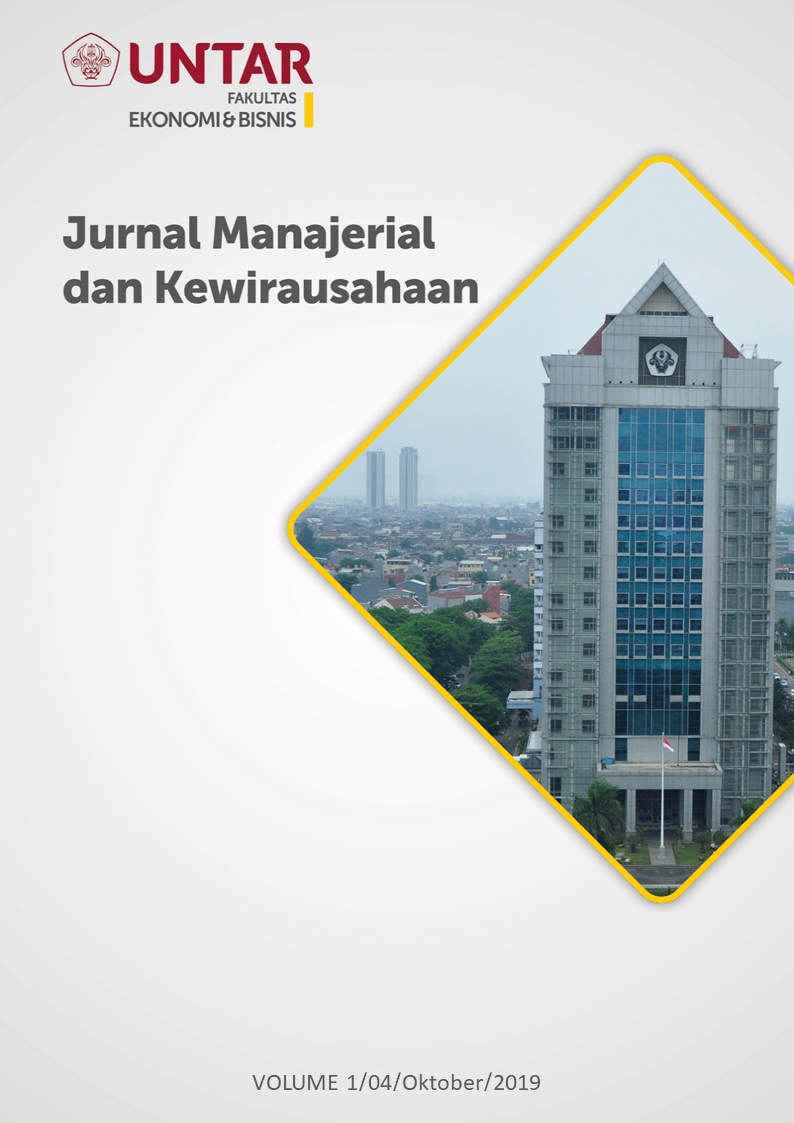Pengaruh Hubungan Dimensi Orientasi Kewirausahaan Terhadap Kinerja Bisnis Keluarga Di Jakarta Barat
Main Article Content
Abstract
The purpose of this research is to analyze the influence of entrepreneur dimention orientation on family business performance of West Jakarta. The population in this study were owner of family business at West Jakarta. The method of selecting samples using non-probability samping with purposive sampling techniques. The method of data collection in this study used a questionnare. The conclusion in this study is that there is a positive and significant influence of proactive and take risk on family business performance at West Jakarta and there is no significant influence of innovation on family business performance at West Jakarta.
Penelitian ini bertujuan untuk mengetahui pengaruh hubungan dimensi orientasi kewirausahaan terhadap kinerja bisnis keluarga di Jakarta Barat. Populasi dalam penelitian ini adalah pemilik bisnis keluarga yang berlokasi di Jakarta Barat. Metode pemilihan sampel menggunakan non-probability samping dengan teknik pengambilan sampel purposive sampling. Metode pengumpulan data dalam penelitian ini menggunakan kuesioner. Kesimpulan dalam penelitian ini adalah terdapat pengaruh positif dan signifikan proaktif dan pengambilan risiko terhadap kinerja bisnis keluarga di Jakarta Barat tetapi terdapat juga pengaruh yang tidak signifikan antara inovasi terhadap kinerja bisnis keluarga di Jakarta Barat.
Article Details
Section
This work is licensed under a Jurnal Muara Ilmu Ekonomi dan Bisnis Creative Commons Attribution-ShareAlike 4.0 International License.,/p>
References
Aloulou, J. Wassim. (2018). Examining entrepreneurial orientation’s dimensions –
performance relationship in Saudi family businesses. Journal of Family Business
Management, 126-144.
Ancok, D. (2012). Psikologi Kepemimpinan dan Inovasi. Penerbit Erlangga.
Andriani Suryanita. (2006). Analisis Pengaruh Orientasi Kewirausahaan dan Kompetensi
Pengetahuan Terhadap Kapabilitas Untuk Meningkatkan Kinerja Pemasaran. Tesis.
Universitas Diponegoro, Semarang.
Aritonang, R. Lerbin, R. (2007). Teori dan Praktik Riset Pemasaran. Bogor: Ghalia
Indonesia.
Basrowi. (2011). Kewirausahaan untuk perguruan tinggi. Bogor: Ghalia Indonesia.
Carlsson, B., Braunerhjelm, P., McKelvey, M., Olofsson, C., Persson, L & Ylinenpaa, H.
(2013). The evolving domain of entrepreneurship research : Small Business
Economics. Vol. 41 No. 4, pp. 913-930.
Casillas, J.C. and Moreno, A.M. (2010). “The relationship between entrepreneurial
orientation and growth: the moderating role of family involvement”, Entrepreneurship
and Regional Development, Vol. 22 Nos 3-4, pp. 265-291.
Chow, I.H. (2006). The relationship between entrepreneurial orientation and firm
performance in China : S.A.M Advanced Management Journal. Vol. 71 No. 3, pp. 11-
Henseler, J., Ringle, C. M., & Sinkovics, R. R. (2009). The use of partial least squares path
modeling in international marketing. Advances in international marketing, 20, 277-
Joo, Baek.Kyoo. and Lim, Taejo. (2009). The Effects of Organizational Learning Culture,
Perceived Job Complexity, and Proactive Personality on Organizational Commitment
and Intrinsic Motivation. Reserch article. Vol 16, issue 1, 2009.
Kraus, S., Rigtering, C., Hughes, M. and Hosman, V. (2012). “Entrepreneurial orientation
and the business performance of SMEs: a quantitative study from the Netherlands”,
Review of Managerial Science, Vol. 6 No. 2, pp. 161-182
Ma’atoofi, A. R. & Tajeddini, K. (2010). The Effect of Entrepreneurship Orientation on
Learning Orientation and Innovation: A Study of Small-Sized Business Firms in Iran.
International Journal of Trade, Economics and Finance, 1 (3), 254-260.
Malhotra, Naresh K. (2010). Marketing Reseach : An Applied Orientation Sixth Edition
Peason Education.
Matsuno Ken. John T Mentzer & Aysegul Ozsomer. (2002). The effects of entrepreneurial
proclivity and market orientation on business. Journal of Marketing. ABI/INFORM
Global pg. 18.
Rauch A., Wiklund, J., Lumpkin, G.T., & Frese, M. (2009). Entrepreneurial orientation and
business performance : An assessment of past research and suggestions for the future
. Entrepreneurship Theory and Practice, (5), 761- 786.
Stenholm, P., Pukkinen, T. & Heinonen, J. (2016) .Firm growth in family businesses – the
role of entrepreneurial orientation and the entrepreneurial activity : Journal of Small
Business Management. Vol. 54 No. 2, pp. 697-713.
Sugiyono. (2010). Metode Penelitian Pendidikan Pendekatan Kuantitatif, kualitatif, dan
R&D. Bandung: Alfabeta.
Tenenhaus, M. (2005). PLS Regression and PLS Path Modeling for Multiple Table Analysis.
COMPSTAT 2004 Proceedings. Physica-Verlag, Springer, Wurzburg, Berlin.
Thomas Zellweger. (2017). Managing Family Business. Edward Elgar. ISBN: 978 1 78347
3.
Yamin, Sofyan & Heri Kurniawan. (2009). Struktural Equation Modeling: Belajar Lebih
Mudah Teknik Analisa Data Kuesioner dengan Lisrel-PLS. Jakarta: Salemba Infotek.

